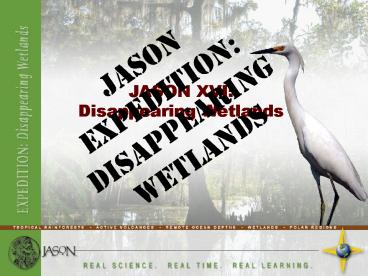JASON XVI: - PowerPoint PPT Presentation
1 / 16
Title: JASON XVI:
1
JASON Expedition Disappearing Wetlands
JASON XVI Disappearing Wetlands
2
JASON Expedition New Features
- New larger size Teacher Edition with easier to
use format - Complete Student Activity Book (option to
purchase multiple copies) - Getting Started CD for self-training
- Clearer ties to State and National Standards
- Multiple Written Assessments
- Correlations to major texts and science kits
3
New Instructional Administrative Features
- Content designed for 2 years following Expedition
- Opportunity to use JASON Expedition for 1 year, 2
years, or 3 years - JASON can follow your students for 1 year, 2
years, or 3 years
4
Multiple Expeditions
5
The JASON Expedition provides Curriculum content
directly reinforcing state and national standards
Life Science Earth/Space Physical
Science Terrestrial mammals Plate tectonics
Machines energy Food webs
Climatology Buoyancy Populations/Ec
osystems Geologic history Sound light Plant
Processes Satellite remote sensing
Erosion Biodiversity Environmental change
Sedimentation Ecology
6
Alignments with Science Textbooks
- Prentice Hall Science Explorer Series
- Holt Science Technology (Earth, Life, and
Physical Science) - Holt Science Technology Short Courses
- Glencoe Science Integrated Series (Level Red,
Green, and Blue) - Glencoe Science Voyages Earth, Life, and
Physical Sciences - Scott Foresman Science Grades 5 6
7
Alignments with Science Kits
- FOSS Landform Modules
- FOSS Environmental Modules
- AIMS Exploring Environments
- Carolina Biological Land and Water Unit
- Carolina Biological Classroom River Kit
- Carolina Biological Stream Table Kit
Keywords Will Be Provided For Those Kits
And Textbooks Not Listed
8
Broadcast Components
LIVE BroadcastA 6 day (Jan. 31 Feb. 5, 2005)
live event that showcases host researchers,
students and teachers studying and comparing
wetland ecosystems in Louisiana Broadcast
Video A tape of the LIVE Broadcast, available
free through the TJO registration process or for
an additional cost if purchased separately
9
Why Wetlands?
- Wetlands are everywhere
- Wetlands are a natural laboratory for studying
life, earth, and physical science concepts - Wetlands are important ecosystems in all parts of
the world - Habitat for incredible diversity of plants and
animals - Nurseries for countless species of fish and
shellfish - Filter and purify fresh water
- Protect coastlines from hurricanes and storm
surges - Wetlands are threatened ecosystems
10
Why Louisianas Wetlands?
- A State of National Importance
- 40 of Americas total seafood catch is connected
in some way with Louisianas coast - 1/5 of Americas domestic oil supply
- 1/4 of Americas natural gas supply
- Greatest wetlands in the nation experiencing the
greatest loss - Mississippi River
- 3rd largest river in the world
- Drains 40 of the U.S. and parts of Canada
- Altered for navigation and safety
- Critical to the Nations economy
11
(No Transcript)
12
(No Transcript)
13
(No Transcript)
14
What about the Novels?
15
Unit 1 Earth Science
Denise Reed, Ph.D. Geologist
University of New Orleans, LA
Rachel Sweeney Coastal
Restoration Projects Manager NOAAs National
Marine Fisheries Service, LA
Unit 2 Life Science
Jacoby Carter, Ph.D. Ecologist USGS
Biological Resources DivisionNational Wetlands
Research Center,
Mark Schexnayder Marine Scientist LSU AgCenter
/ Louisiana Sea Grant
16
Unit 3 Science, Technology Society
Marco Giardino, Ph.D Remote Sensing Scientist
NASA Stennis Space Center
Earl Melancon, Ph.D.Marine BiologistNicholls
State University, LA
Video Student Hosts
Ike Akagha,
U.S. Air Force
Academy Prep
JASON XI Argo - EDS
PIN Site -
Kristen Goodrich, University of Miami, JASON XI
Argo BOCES PIN site, NY































